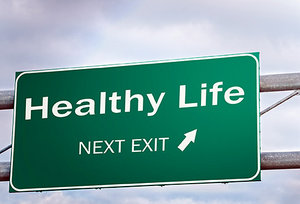Healthy Lifestyle Habits: As Important as Your Genes?
By Julie T. Chen, MD
There's a long-standing debate about whether genetics are more important than the environment in our overall health. The simple question of nature versus nurture, however, is too simplistic, and while scientists and doctors understand the two are in fact deeply interwoven, we are just on the brink of discovering how much our DNA affects our health – and also how much our lifestyle affects our DNA.
In 2009, a paper published in the
American Journal of Clinical Nutrition reported on a study of 1,034 complete pairs of twins from Denmark and Finland. The objective of the study was to examine the genetic variation of body mass index (BMI), waist circumference, and percentage body fat in relation to physical activity and protein intake.
A study like this has huge implications. This study suggests what we eat and what we do, as in level of physical activity, can help us determine our health. It's not just a matter of genetics. The results of the study confirmed previous findings ,and the researchers were able to conclude that physical activity and diet do have a noticeable and significant effect on your weight, despite your genetic predisposition.
While the impact of a protein-rich diet on weight is still uncertain based on this study, the effect of exercise on weight is clear. Using complete pairs of twins, we were able to have a better understanding of the role that physical activity has in reducing weight and percentage body fat. Further studies on protein and how that affects the expression of obesity gene still needs to be done.
 With regards to genetics, things get a little more interesting in this study. High levels of physical activity were associated with a significant reduction in genetic variation. What this means is evidence strongly suggests high levels of physical activity can modify the expression of the genes responsible for predisposition to obesity. This further supports a previous study that found an increase in BMI due to the rs9939609 polymorphism of the FTO gene in sedentary individuals, but not in physically-active individuals. The excuse, "It's genetic," may no longer apply to our health, at least with regards to our weight and waist circumference.
With regards to genetics, things get a little more interesting in this study. High levels of physical activity were associated with a significant reduction in genetic variation. What this means is evidence strongly suggests high levels of physical activity can modify the expression of the genes responsible for predisposition to obesity. This further supports a previous study that found an increase in BMI due to the rs9939609 polymorphism of the FTO gene in sedentary individuals, but not in physically-active individuals. The excuse, "It's genetic," may no longer apply to our health, at least with regards to our weight and waist circumference.
Since 2009, myriad studies support the theory that lifestyle and diet have an effect on one's genetics and health. We're gradually gaining an understanding of how our genes are expressed and the control individuals have over them through lifestyle and diet choices.
As with many other aspects of our lives, it's important that in the realm of health, each individual practice the ancient Greek aphorism: Know thyself. If you know you have a family history or genetic predisposition to obesity, heart disease or other conditions, you have a choice (to a certain degree) in how that gene is expressed. And while you may be genetically inclined toward certain medical conditions or physical traits, your choices in lifestyle and diet can influence your risk of developing those attributes.
As technology becomes more accessible, it's become easier for individuals to attain in-depth DNA reports in addition to their family history. Knowledge is power, and understanding both your genetic makeup and lifestyle is key. At the end of the day, what your genetics say about you can be adjusted and altered depending on factors in your life such as diet and exercise and other lifestyle habits. So, if you are concerned about any disease patterns that seem to run in your family, first see your doctor about it for testing; but then adjust your daily habits to promote the good and not the bad. That means eat healthy, get plenty of rest, find time to relax and make sure to incorporate exercise into your daily life.
Dr. Julie T. Chen is board-certified in internal medicine and fellowship-trained and board-certified in integrative medicine. She has her own medical practice in San Jose, Calif. She is the medical director of corporation wellness at several Silicon Valley-based corporations, is on several medical expert panels of Web sites and nonprofit organizations, is a recurring monthly columnist for several national magazines, and has been featured in radio, newspaper, and magazine interviews. She incorporates various healing modalities into her practice including, but is not limited to, medical acupuncture, Chinese scalp acupuncture, clinical hypnotherapy, strain-counterstrain osteopathic manipulations, and biofeedback. To learn more, visit www.makinghealthyez.com.

